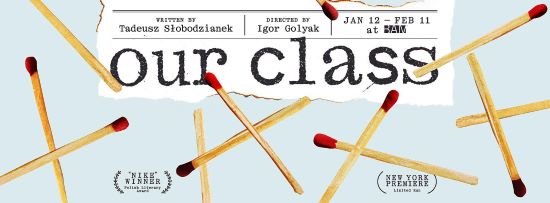STAGED AT AN EMOTIONAL DISTANCE, OUR CLASS
IS A HARROWING REMINDER OF ONGOING ANTISEMITISM
At a recent viewing of Joshua Harmon’s Broadway play Prayer for the French Republic, French Jews no longer feel safe with the overt antisemitism in Paris and ultimately ask themselves, “Why do they hate us?” In Our Class by Tadeusz Słobodzianek (adapted by Norman Allen from Catherine Grovesnor’s literal translation), Polish Jews experience similar antisemitism — but then an unthinkable act occurs: a pogrom murders 1,600 Jews. Only a few survive who ultimately ask themselves, “How could this happen?”
Stephen Ochsner
Richard Topol
In both plays, the antisemitism isn’t coming from an invading army and/or German Nazis but rather at the hands of classmates and neighbors. Based on a true story — an actual pogrom in Jedwabne when Polish villagers murdered hundreds of Jews, many burned alive in a barn — Our Class follows ten schoolmates (five Jews and five Christians) from elementary school till their deaths, a few surviving into the new millennium. The two-act play, lasting three hours in total, shows friendship, love, division, and madness that changes lives forever.
Gus Birney
The production includes acts of violence, sexual assault, and extreme antisemitism but does so with a story-theater flair that avoids any type of severe realism. The audience is often reminded that we are in a theater, experiencing a theatrical event, and that the actors aren’t really experiencing such atrocities. Very Brechtian in both its writing and staging, the actor narration and Igor Golyak’s inventive staging holds us back as keen observers rather than allowing us to be emotionally triggered.
The Cast of OUR CLASS
Andrey Burkovskiy, Tess Goldwyn
Mr. Golyak was born in Ukraine and trained in directing at the Russian Academy of Theatre Arts. His non-American presentational approach serves the play well, and his imaginative staging of such horrors is a welcome relief from realism.
Tess Goldwyn, Andrey Burkovskiy
The Fishman Space at BAM is set as a bare black box stage with only a semicircle of chairs. The only set piece by scenic designer Jan Pappelbaum appears to be a large black chalkboard on the back wall where a list of the characters’ names and years of life are printed. As the reading begins, with scripts in hand, the actors say their lines as if reading cold. When they come to an unfamiliar childhood school song, a video clip is provided to teach the melody. Dressed in what appears to be contemporary clothes, Sasha Ageeva’s costume design avoids any period-looking showmanship. Eventually, the house lights dim to black and minimalist production values are slowly introduced. Before you know it, we’ve slipped into a fully realized story-theater production, the type of which is rarely as innovative as what Mr. Golyak and his designers offer. In addition to his many directing awards and New York work, let this performance act as a welcoming introduction to his Arlekin Players Theatre in Needham, Massachusetts, a company of immigrant artists who have performed all over the world.
Will Manning, Elan Zafir, José Espinosa, Andrey Burkovskiy
Ilia Volok, Alexandra Silber
In truth, I’m not sure why both acts begin as a play reading, but you can trust that Mr. Golyak won’t leave you there for long — thankfully; while it may suggest that these atrocities still occur today, the conceit is a bit off-putting. The oversized chalkboard is the main set piece and, throughout the performance, is filled with names, drawings, and video projections. The other design elements also sneak into existence with unexpected appreciation: Adam Silverman with lights, Ben Williams with sound, and Anna Drubich as composer. My favorite design contributions are the projections by Eric Dunlap and chalk drawings designed by Andreea Mincic. Together, they bring the chalkboard to life with moving images, live feeds, and drawings that appear and disappear.
Stephen Ochsner
The 10-member acting company is evenly gifted, committed, and admired: Gus Birney, Andrey Burkovskiy, José Espinosa, Tess Goldwyn, Will Manning, Stephen Ochsner, Alexandra Silber, Richard Topol, Ilia Volok, and Elan Zafir. On top of which, the stage management team and backstage crew must be acknowledged and respected (Kyra Bowie, production stage manager). The large number of props and chalk dust that fill the stage is staggering. By the final blackout, what a mess and what a needed clean-up. Much like the themes of the play.
Gus Birney, Andrey Burkovskiy
“Why do they hate us?” “How could this happen?” Such vital, relevant questions must continue to be asked well into the 21st century, if not forever. Another question that could be added to the mix: Will violence against Jews never end? Until then, such horrific stories of antisemitism must be revisited time and again in hopes to prevent history from repeating itself. The play’s final third answers one additional question: Will karma get the final say? You bet your ass. Let that act as a warning for us all.
The Cast of OUR CLASS
photos by Pavel Antonov
The Cast of OUR CLASS
Our Class
Arlekin Players Theatre
part of the 2024 Under the Radar Festival
Brooklyn Academy of Music (BAM) Fisher Fishman Space, 321 Ashland Place in Brooklyn
Tue-Fri at 7; Sat at 2 & 7:30; Sun at 2
ends on February 4, 2024 EXTENDED to February 11, 2024
for tickets ($59-$129), visit Our Class or BAM

